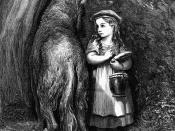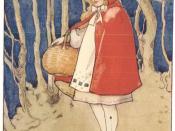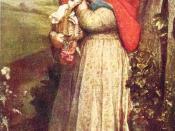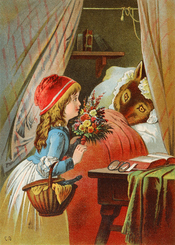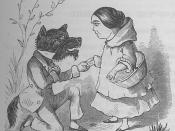The female perspective is a critical element that has been persistently neglected throughout cultures due to the prevalence of the patriarchy. This has meant that literature itself manifests as a male institution, shaped by men's minds and voices who view the female experience as trivial and unworthy of consideration. Therefore, being unable to express their own perspectives and discriminated against in their writings, women are a marginalized group. But, in their portrayal, are they truly victims of a patriarchal society? Certainly Sylvia Plath's Daddy (1962) paints a despairing picture of suppression and inner anguish, a woman driven mad by the men in her life - though is this really the case? For Ania Walwicz challenges this concept of a helpless damsel in distress by subverting the traditional fairytale in Little Red Riding Hood (1982), thus undermining masculine values about women and their sexuality. Through the examination of these two texts, the extent of women's victimization by a patriarchal society can be determined.
Written in the early 60's, the pre-era of the feminist movement, Sylvia Plath's Daddy reflects the increasing atmosphere of feminist awareness - a harsh critique of patriarchal authority and women's relegation to passive roles. The persona is of an angry daughter trying to come to terms with the betrayal of men in her life; events that parallel Plath's own strained relationship with her father and her failed marriage. Hence, the poem is filled with Nazi and Gothic imagery to emphasize the victimization that the narrator feels at the hands of these men ("fascist", "Luftwaffe", "devil", "vampire"). By constantly comparing her and her father with a Jew and Nazi respectively, the narrator darkly enforces the dictatorship of her father over her, almost to a sense where her identity as a person has been dominated and annihilated like the genocide of the Jews in the hands of Hitler - "Chuffing me off like a Jew/ A Jew to Dachau, Auschwitz, Belsen ⦠I have always been scared of you/ With your Aryan eye." There is no doubt that the narrator is a victim for as the poem progresses, the father changes into increasingly more horrific and formidable creatures of evil to show how omnipresent and unending her trauma over her now dead father has manifested - even her husband is described as the second reincarnated vampire of him, "The vampire who said he was you." In this way, it is fitting that the protagonist is portrayed as both a daughter and a wife, that is, women of inferior status and always under the social control of men.
Yet, at the same time, the girl in Walwicz's Little Red Riding Hood is also a daughter, but she does not exhibit the frustration and oppression of the narrator in Daddy. This may be due to the difference in contexts of the poems - the later Little Red Riding Hood was written in the 80's, at the end of the feminist movement, where feminists demands for equal opportunity were increasingly accepted and there was a literary shift towards postmodernism, the questioning of the absolutes. Indeed, Little Red Riding Hood reflects this through its subversion of the traditional same-titled story. Whereas the original intention of Charles Perrault's fairytale was to warn girls about promiscuity, this poem reverses it by portraying a woman's sexuality as liberating not restrictive. The repetition in "a good time, good time, good time girl" plays a word pun on the stereotypical "good girl" so to emphasize the difference of this Little Red Riding Hood who celebrates her own sex as an empowering article. This is done through the motif of red in the poem, the color of empowerment and passion which also draws attention ("I was so red, so red, so red") as to show her bold nature and that she is in control. In essence, the girl in Little Red Riding Hood is the reciprocal of the standard socialized female - far from being the victim, she is her own savior.
But can the difference in context bear the sole blame for the poems' contrasting representations of their women - one emerging as victor, the other as victim? Though they may be significant influences, the inclination is negative for the patriarchal society and the social superiority of men are clearly acknowledged in both poems. The voice of "Little Red Riding Hood" uses short, simple and often repetitive sentences to suggest a little girl speaking, and the nursery rhyme-like structure of Daddy and its infantile choice of words, like "Achoo", portrays the adult narrator as childish. In this sense, they are represented as girls, not women, to convey their lesser status in the prevailing patriarchal societies of both poems. Hence, the patriarchy cannot be ultimately responsible for the victimization of women if, in two poems set against a patriarchal background, only one portrays women as victims.
The answer, however, lies in how the women respond to the patriarchy and their sexually-biased oppression. In Daddy, its nursery-rhyme structure, the same technique used to introduce the notion of the patriarchy, also reinforces the tragic naivety of the narrator and her status as a victim - she is haunted by her childhood and cannot move on, which is epitomized in the way she stills calls her father "Daddy". However, in the Little Red Riding Hood, the simple childishly short sentences, that convey a lesser status, becomes merely a guise of girly innocence with a hidden motive - to prey on men and give her the upper hand. "Want some sweeties, mister?" attracts unsuspecting men to her and the world choice of "mister" is ironic as it is the girl, not the wolf, who holds the real power for she is the one who "brought a knife." Therefore, unlike the victim protagonist in Daddy, the girl in Little Red Riding Hood is more of a perpetrator, demonstrated by the knife which is an implement of action and a symbol of freedom.
So the simple factor of the protagonist in Little Red Riding Hood taking an active stand, taking control of her own life, critically differentiates her outcome from the narrator in Daddy. Assertiveness paves way for the independence that is conveyed in Little Red Riding Hood through its use of rhetorical questions. The narrator takes control by using her own initiative to ask "Want some sweeties, mister?" and overturns the social construct of females being submissive, challenging the patriarchy. First person narration moreover ensures that Little Red Riding Hood plays the active part in her own story so that she is not objectified. Though "Daddy" also uses first and second person, it serves a different purpose to point out the narrator's victimization. For an example, "You do not do, you do not do" directly accuses the reader of abusing her and is similar to a self-help mantra in which she acknowledges her passivity and victimization in her trying to overcome it. So, in this sense, the narrator in Daddy cannot be fully labeled as a self-pitying victim for she does try to conquer her victim status. However, unlike the Walwicz's Little Red Riding Hood, the actions of Daddy's protagonist reflect the influence of the men in her lives, and are not necessarily out of her own personal will.
Therefore the self-destructive actions of the narrator in Daddy make her an accomplice in her own misery. In her obsession with reviving her father who failed her by dying at his peak in glory ("You died before I had time/ Marble-heavy, a bag full of God"), she marries "a model of you", hence perpetuating the cycle of victimization the poem has detailed. For her father has not inflicted any physical harm to her, as it is merely the fact that she is unable to let go of his death that keeps in her limbo of torment. This is conveyed through her childish calling him "Daddy" and the constant repetition of "You", referring to her father, which shows that she cannot stop thinking about him. Indeed such repetition of "You" and similar sounding words like "Jew" and "through" creates a mournful quality to the poem. Her self-destructive behavior is exemplified in her suicide attempt ("At twenty I tried to die") which literally shows that she is killing herself.
In not being able to form a clear sense of identity, the narrator in Daddy fails to master her inner voice. Such absence is conveyed in the overwhelming theme of fragmentation within the poem, which echoes the mental illnesses that Sylvia Plath was plagued with during her life. In "black shoe/ In which I have lived like a foot", the narrator describes herself as a "foot", indicating that she is incomplete and has been deprived in the lack of freedom of living inside the cramped "shoe". Her broken stuttering of "Ich, ich, ich, ich/ I could hardly speak" along with the poem's ambiguous ending demonstrates her failure to find her feminine voice amongst the oppression of the men. For "Daddy, daddy, you bastard, I'm through" is ominous in its ambiguity as "through" can equally imply giving up as well as survival through adversity. In fact, the latter seems more appropriate as Plath committed suicide just months after writing this poem. On the other hand, Little Red Riding Hood is a clear medium for the feminine voice. Though fragmentation also features heavily, it is used to build up intensity with the sudden starts and stops, to demonstrate the fervent vitality of the girl - "I was so lively, so livewire tense, such a highly pitched little." This girl has her own opinion and is unafraid to voice it for Little Red Riding Hood's last line is "I brought a knife" for shock value. The sentence is short and swift to enforce the subject "I" and the knife is a symbol of Little Red Riding Hood's feminine voice for it can be used to metaphorically kill men, which brings freedom, and is closely linked with the red color of the girl's hood - red is the color of blood and empowerment, and the knife is the cause of the blood, hence empowerment too. So by repeating "I brought a red dress myself", Little Red Riding Hood proudly displays this red garment for it is proof that her feminine voice (disguised as her knife) is alive and thriving.
In conclusion, women are not always the victims of the patriarchal society. Certainly change in time has lifted the social constraints of women, as evident in the poems, but it is ultimately the woman's reaction to such barriers that determine if she shall conquer or be conquered by it. So women fall not victims to a patriarchal society, if they become victims at all, but instead they victimize themselves in taking on the suffering imposed by the patriarchy.
Bibliography: Walker, Kim. Women Writers of the English Renaissance. New York: Twayne, 1996.
Sylvia Plath: Method & Madness (A Biography) (2004, Schaffner Press, 2Rev Ed) by Edward Butscher

